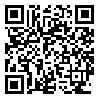Volume 8, Issue 1 (5-2022)
فصلنامه تحقیقات بنیادین علوم انسانی 2022, 8(1): 128-128 |
Back to browse issues page
Download citation:
BibTeX | RIS | EndNote | Medlars | ProCite | Reference Manager | RefWorks
Send citation to:



BibTeX | RIS | EndNote | Medlars | ProCite | Reference Manager | RefWorks
Send citation to:
Fazel Falavarjani D, Garehbaghi H. Normative Theory; A Theory for the Transition Period. فصلنامه تحقیقات بنیادین علوم انسانی 2022; 8 (1) :128-128
URL: http://frh.sccsr.ac.ir/article-1-407-en.html
URL: http://frh.sccsr.ac.ir/article-1-407-en.html
Abstract: (1034 Views)
One of the key questions of the present age is how we should deal with the products of modern science in a religious atmosphere. To answer the above question, there are approaches among Muslim thinkers; From the absolute acceptance of these products as the achievements of human endeavor to the complete denial of these achievements as two completely reciprocal views and finally intermediate theories such as the separation between the humanities and natural sciences and the attempt to religiousize the humanities because of its atheistic principles; Using natural science products as useful achievements of human experience.
In the meantime, according to normative theory, while using the achievements of experimental sciences as scientific advances, it is necessary to attach religious norms to them, as scientific ethics and cultural attachment, in order to reduce their harm. In this article, while explaining, reviewing and criticizing the above views, the strengths and weaknesses of normative theory have been studied and this theory has been proposed as a practical theory only for the period of transition from modernity to the arrival of religious civilization.
In the meantime, according to normative theory, while using the achievements of experimental sciences as scientific advances, it is necessary to attach religious norms to them, as scientific ethics and cultural attachment, in order to reduce their harm. In this article, while explaining, reviewing and criticizing the above views, the strengths and weaknesses of normative theory have been studied and this theory has been proposed as a practical theory only for the period of transition from modernity to the arrival of religious civilization.
Keywords: Religious Civilization, Modernity, Realm of Religion, Atheism, Humanism, Materialism, Monotheism.
Send email to the article author
| Rights and permissions | |
 |
This work is licensed under a Creative Commons Attribution-NonCommercial 4.0 International License. |







